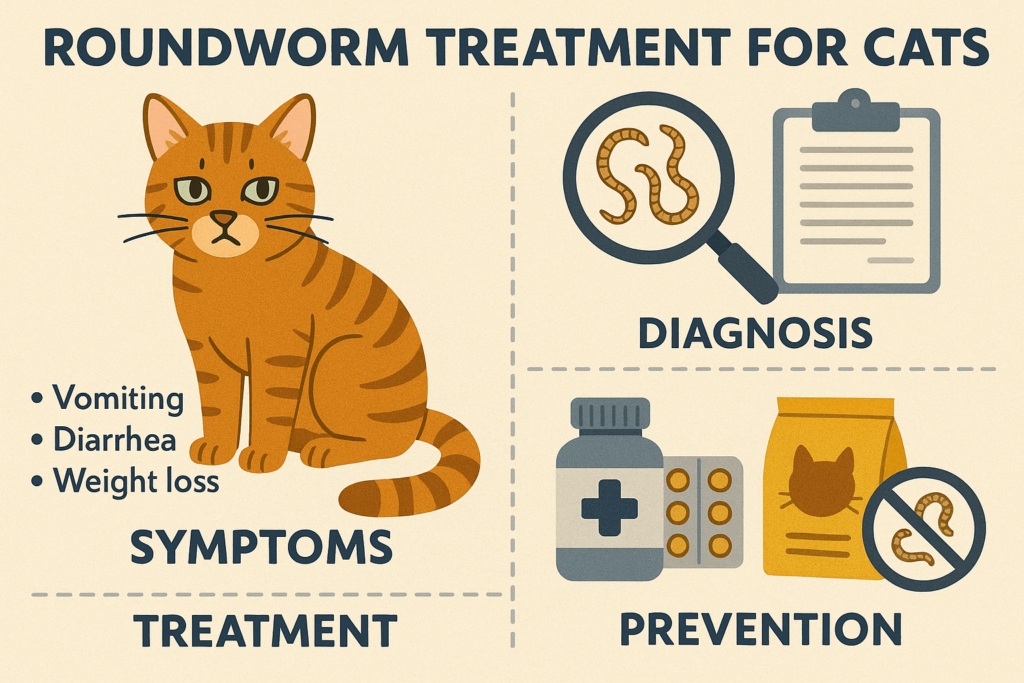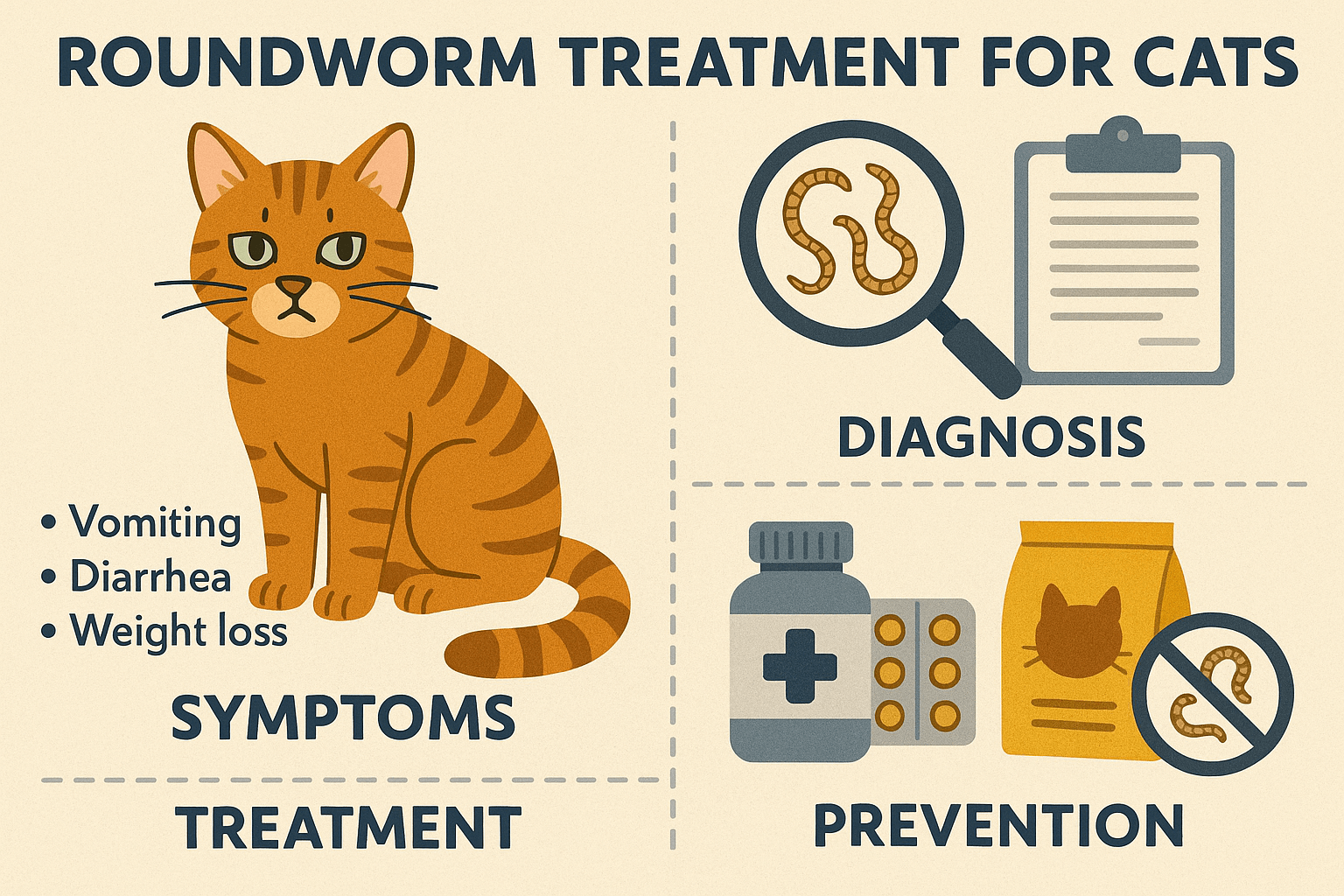Roundworm Treatment for Cats: Keeping Your Feline Healthy
Roundworms are one of the most common intestinal parasites that affect cats, especially kittens and outdoor felines. These pesky worms can cause a range of health issues, from mild discomfort to severe complications if left untreated. Fortunately, roundworm treatment for cats is widely available and highly effective when administered correctly. Understanding how to identify, treat, and prevent roundworm infections is essential for ensuring your cat’s well-being. In this guide, we’ll explore everything you need to know about managing roundworms in cats, from recognizing symptoms to implementing preventive measures. Let’s dive into the world of feline health and learn how to keep those purrs happy and parasite-free.
Expert Insight on the Risks of Roundworm Infections in Cats
“Although it is usually not life-threatening in adult cats, a roundworm infection can kill kittens and older cats. Kittens often have fewer reserves to compensate for loss from the roundworm; older cats may have other diseases that decrease their body’s ability to compensate for loss.”
Signs Your Cat May Have Roundworms
Detecting a roundworm infection early is crucial for prompt treatment and minimizing risks to your cat’s health. Look out for these common signs that may indicate your feline friend is dealing with an unwelcome guest.
Visible Worms in Vomit or Stool:
One of the most obvious signs is seeing spaghetti-like worms in your cat’s vomit or feces. These are often roundworms themselves.Pot-Bellied Appearance:
Kittens with roundworms may develop a distended abdomen, giving them a “pot-bellied” look despite being underweight.Diarrhea or Constipation:
Gastrointestinal disturbances such as diarrhea or constipation can signal a parasitic infection.Lethargy and Weakness:
Infected cats may appear unusually tired, weak, or less interested in their usual activities.Poor Coat Condition:
A dull, unkempt coat can be a sign of nutrient deficiencies caused by roundworms stealing nutrients from your cat’s digestive system.
If you notice any of these symptoms, it’s important to consult your veterinarian promptly to confirm the diagnosis and begin treatment.

Steps for Effective Roundworm Treatment in Cats
Treating roundworms in cats involves a combination of medication, hygiene practices, and follow-up care. Here’s a step-by-step guide to help you navigate the process effectively.
Consult Your Veterinarian:
Before starting any treatment, visit your vet to confirm the presence of roundworms and rule out other potential health issues.Administer Deworming Medication:
Most treatments involve oral or topical deworming medications designed to kill adult worms and larvae in the intestines.Repeat the Treatment:
A single dose is usually not enough. Follow your vet’s instructions for repeating the treatment after a few weeks to target newly hatched larvae.Clean Up After Your Cat:
Dispose of feces promptly and thoroughly clean litter boxes to prevent reinfection or spreading the parasite to other pets.Monitor for Improvement:
Keep an eye on your cat’s behavior and physical condition to ensure the treatment is working and consult your vet if symptoms persist.
With proper care and adherence to veterinary advice, roundworm treatment can successfully eliminate the infection and restore your cat’s health.
Check this guide 👉Cat Worms Identify: Best 7 Health Tips!
Check this guide 👉Can Cats Eat Mealworms? Best 7 Expert Tips!
Check this guide 👉Rice Tapeworms in Cats: Best 7 Expert Tips!
Preventive Measures for Roundworms | Risks of Untreated Roundworms |
|---|---|
Regular deworming for kittens | Malnutrition due to nutrient loss |
Keeping cats indoors | Intestinal blockages in severe cases |
Cleaning litter boxes daily | Spread of infection to other pets |
Washing hands after handling cats | Potential transmission to humans |
Avoiding contact with contaminated soil | Weakened immune system in affected cats |
How to Prevent Roundworm Infections in Cats
Prevention is always better than cure, especially when it comes to roundworms. By taking proactive steps, you can significantly reduce the risk of your cat contracting these parasites.
Schedule Regular Vet Check-Ups:
Routine veterinary visits allow for early detection and treatment of roundworms before they become problematic.Practice Good Hygiene:
Wash your hands thoroughly after handling your cat or cleaning their living space to avoid spreading parasites.Keep Cats Indoors:
Outdoor cats are more likely to encounter contaminated soil or prey animals carrying roundworm eggs.Deworm Kittens Early:
Begin deworming treatments for kittens as early as three weeks old, following your vet’s recommendations.Avoid Feeding Raw Meat:
Raw diets can harbor harmful parasites, including roundworms. Opt for high-quality, cooked cat food instead.
By incorporating these preventive measures into your routine, you can protect your cat from roundworm infections and ensure a healthier life.
Understanding the Lifecycle of Roundworms
Knowing the lifecycle of roundworms helps explain how they infect cats and why treatment requires multiple steps. Here’s a breakdown of their development stages.
Egg Stage:
Roundworm eggs are shed in the feces of infected animals and can survive in the environment for years.Larval Stage:
Once ingested, the eggs hatch into larvae, which migrate through the cat’s body, including the lungs and liver.Maturation in the Intestines:
The larvae eventually return to the intestines, where they mature into adult worms and begin producing eggs.Reinfection Risk:
Cats can become reinfected by ingesting contaminated soil, prey, or even grooming themselves.Zoonotic Potential:
Roundworm eggs can also infect humans, particularly children, making prevention critical for both pets and people.
Understanding this lifecycle underscores the importance of thorough treatment and ongoing prevention efforts.
Common Mistakes to Avoid When Treating Roundworms
Treating roundworms requires precision and care to ensure success. Avoiding these common mistakes can make the process smoother and more effective.
Skipping Follow-Up Doses:
Missing subsequent treatments allows remaining larvae to mature, perpetuating the infection. Always complete the full course.Neglecting Environmental Cleanliness:
Failing to clean your cat’s living area increases the risk of reinfection. Focus on hygiene to break the cycle.Using Incorrect Dosages:
Administering too little or too much medication can compromise treatment. Stick to your vet’s prescribed dosage.Ignoring Other Pets in the Household:
If one pet is infected, others may be at risk. Treat all animals simultaneously to prevent cross-contamination.Assuming Symptoms Will Resolve on Their Own:
Without treatment, roundworms can worsen over time. Don’t wait for symptoms to disappear without intervention.
Avoiding these pitfalls ensures a successful recovery and reduces the likelihood of future infections.
Natural Remedies for Roundworm Prevention
While veterinary treatments remain the gold standard, some natural remedies can complement traditional methods for roundworm prevention.
Pumpkin Seeds:
Ground pumpkin seeds have anti-parasitic properties and can be added to your cat’s food in moderation.Probiotics:
Probiotics support gut health and may help strengthen your cat’s immune system against parasitic infections.Chamomile Tea (Diluted):
A small amount of diluted chamomile tea may soothe digestive upset caused by roundworms, though it won’t eliminate them.Coconut Oil:
Adding a tiny amount of coconut oil to your cat’s diet may help deter parasites due to its lauric acid content.Herbal Supplements (Vet-Approved):
Some herbal supplements, like wormwood or garlic (in minimal amounts), may assist with prevention but require vet approval.
Natural remedies should never replace professional treatment but can serve as supplementary tools for overall wellness.
How to Educate Others About Roundworm Risks
Spreading awareness about roundworms can help protect both pets and people. Here’s how you can educate friends, family, and fellow pet owners.
Share Information About Zoonosis:
Explain how roundworms can infect humans, emphasizing the importance of handwashing and hygiene around pets.Encourage Regular Vet Visits:
Highlight the role of routine check-ups in detecting and preventing parasitic infections early.Promote Indoor Living for Cats:
Discuss the benefits of keeping cats indoors to reduce exposure to contaminated environments.Advocate for Responsible Pet Ownership:
Stress the importance of cleaning litter boxes, disposing of waste properly, and monitoring pets’ health.Provide Resources on Deworming Protocols:
Share basic guidelines on deworming schedules, especially for kittens and outdoor cats, to encourage proactive care.
By educating others, you contribute to a safer, healthier community for pets and their human companions.
Frequently Asked Questions About Roundworm Treatment for Cats
Can roundworms harm humans?
Yes, roundworm eggs can infect humans and cause conditions like toxocariasis, so practicing good hygiene is essential.
How long does roundworm treatment take?
Treatment typically involves two doses spaced 2-3 weeks apart, but follow-up care may be needed.
Are over-the-counter dewormers safe?
While some OTC products are effective, it’s best to consult your vet for a tailored treatment plan.
Can indoor cats get roundworms?
Yes, indoor cats can contract roundworms through contaminated soil brought inside or exposure to infected fleas.
What happens if roundworms aren’t treated?
Untreated roundworms can lead to malnutrition, intestinal blockages, and potentially fatal complications in severe cases.
Protecting Your Cat from Roundworms: A Commitment to Health
Roundworm treatment for cats is a manageable and effective way to address this common parasite, ensuring your feline remains healthy and happy. By staying vigilant, following veterinary advice, and implementing preventive measures, you can minimize the risks posed by roundworms. Remember, your cat relies on you for their well-being—regular check-ups, cleanliness, and proactive care go a long way in keeping those purrs loud and strong. With knowledge and dedication, you can create a safe and thriving environment for your beloved pet.
Can a Cat Be Tested for Rabies? Best 7 Expert Tips! – Learn if testing is possible, understand the process, and discover prevention tips to keep your cat safe from rabies.
Can a Dog Be Tested for Rabies? Best 7 Expert Tips! – Learn how rabies testing works, why it’s critical, and what every dog owner needs to know.
Best Vegetables for Cat Food: Best 7 Expert Tips! – Discover safe, nutritious veggies to boost your cat’s diet, support digestion, and enhance overall health naturally.
Best Vegetables for Dog Food: Best 7 Expert Tips! – Discover safe, nutritious veggies to boost your dog’s diet, support digestion, and enhance overall health naturally.





